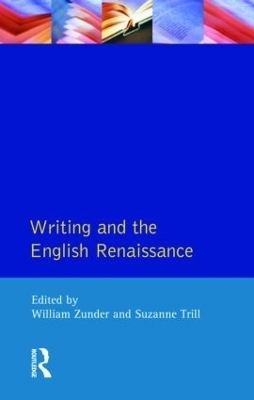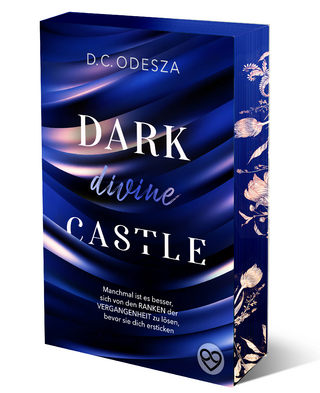
Writing and the English Renaissance
Routledge (Verlag)
9780582229754 (ISBN)
Writing and the English Renaissance is a collection of essays exploring the full creative richness of Renaissance culture during the sixteenth and seventeenth centuries. As well as considering major literary figures such as Spenser, Marlowe, Donne and Milton, lesser known - especially women - writers are also examined. Radical writing and popular culture are considered as well. The scope of the study not only extends the parameters for debate in Renaissance studies, but also adopts a radical interdisciplinary approach, bridging the gap between literary, historical, cultural and women's studies, leading to a much fuller picture of life in the sixteenth and seventeenth centuries.
The authors discussed are placed in their full historical and literary context, with an extensive selection of original documentation included in the text - for example, from The Book of Common Prayer or the Homilies to contextualize the writing under discussion. This distinctive approach, combined with a detailed chronology of the period and bibliography, embracing both canonical and non-canonical writers, makes this volume a unique reference resource and course reader for Renaissance studies.
William Zunder, Suzanne Trill
Preface Chronology Introduction Part I. 1. 'If we shadows have offended: Edmund Spenser and the Elizabethen world of patronage, Marion Wynne-Davies 2. Discourse and dialectic: the work of Christopher Marlowe, William Zunder 3. 'Anxious to amuse': metaphysical poetry and the discourse of Renaissance masculinity, Bruce Woodcock 4. 'When the bad bleed': Renaissance tragedy and dramatic form, Kathleen E. McLuskie 5. Identity and ownership: narratives of land in the English Renaissance, Melanie Hansen 6. Popular culture in the English Renaissance, Mark Thornton Burnett 7. 'Demons in female form': representations of women and gender in murder pamphlets of the late 16th and early 17th centuries, Garthine Walker 8. 16th century women's writing: Mary Sidney's Psalmes and the 'feminity' of translation, Suzanne Trill 9. 'A grain of glorie': George Herbert and 17th century devotional lyrics, Helen Wilcox 10. Marvell's news from nowhere, John Hoyles 11. 'This meaning, not the name': Milton and gender, Tony Davies 12. Preaching common grounds: Winstanley and the Diggers as concrete utopians, Christopher Kendrick 13. Female prophecy in the 17th century, Kate Chedgzoy Part II: Selected Documents 1. From 'An Exhortation Concerning Good Orders and Obedience Rulers and Magistrates' in Certain Sermons or Homilies (1547) 2. From 'The form of solemniation of Matrimony' in The Book of Common Prayer (1547) 3. Thomas Carew, 'A Rapture' (1640) 4. From Sir Philip Sidney, The Defence of Poesy (1595) 5. From Thomas Norton and Thomas Sackville 6. From Ben Jonson, Sejanus, His Fall (1605) 7. From John Webster, The White Devel (1612) 8. From Anon., A Warning for Fair Women (1599) 9. From Arthur Golding, A Brief Discourse of the late Murder of Master George Sanders (1577) 10. From William Camden, Britannia, or A Chorographical Description of the most Flourishing Kingdoms, England, Scotland and Ireland, translated by Philemon Holland (1637) 11. From Barnbe Rich, Faults, Faults and Nothing Else but Faults (1606) 12. Gilbert Dugdale, A True Discourse of the Practices of Elizabeth Caldwell (1604) 13. From The Psalms of David and Others. With Mr John /calvin's Commentaries, translated by Arthur Golding (1571) 14. From Jeremy Taylor, The Rule and Exercises of Holy Iiving (1654) 15. From Joseph Hall, The Art of Divine Meditation (1607) 16. From Andrew Marvell, The Rehearsal Transpros'd: or, Animadversion Upon a Late Book, Entitles, A Preface Showing What Grounds There Are of Fears and Jealousies of Popery (1672) 17. From Desiderius Erassmus, The Praise of Folly, translated by Sir Thomas Chaloner (1559) 18. From Niccolo Machiavelli, The Prince, translated by E D (1640) 19. Gerrard Winstanley, The True Levellers Standard Advanced (1649) 20. From Anna Trapnel, The Cry of a Stone (1654) Notes on contributors Select bibliography Index.
| Erscheint lt. Verlag | 6.3.1996 |
|---|---|
| Reihe/Serie | Crosscurrents |
| Verlagsort | London |
| Sprache | englisch |
| Maße | 138 x 216 mm |
| Gewicht | 670 g |
| Themenwelt | Literatur ► Lyrik / Dramatik ► Dramatik / Theater |
| Geisteswissenschaften ► Sprach- / Literaturwissenschaft ► Anglistik / Amerikanistik | |
| Geisteswissenschaften ► Sprach- / Literaturwissenschaft ► Literaturwissenschaft | |
| Sozialwissenschaften | |
| ISBN-13 | 9780582229754 / 9780582229754 |
| Zustand | Neuware |
| Informationen gemäß Produktsicherheitsverordnung (GPSR) | |
| Haben Sie eine Frage zum Produkt? |
aus dem Bereich


